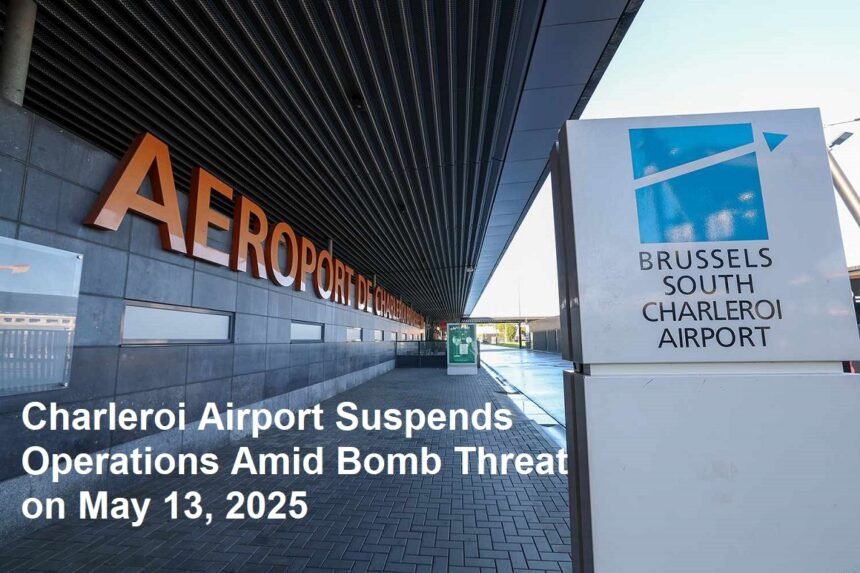On Tuesday, May 13, 2025, Charleroi Airport, Belgium’s second-largest airport, was forced to suspend all operations following a bomb threat reported on one of its departing flights. This unexpected security alert triggered immediate action from airport authorities, law enforcement, and emergency response teams, leading to a temporary closure of the airport to ensure the safety of passengers, staff, and the surrounding community.
Charleroi Airport, officially known as Brussels South Charleroi Airport, serves as a major hub for low-cost carriers and handles millions of passengers annually. Its strategic importance to Belgium’s transportation network means that any disruption can have significant ripple effects on travel and commerce. The bomb threat, therefore, was taken with the utmost seriousness, prompting swift and coordinated measures.
The incident began when airport security personnel received intelligence about a possible explosive device on board a scheduled flight. Upon receiving the threat, the airport immediately activated its emergency protocols. Passengers on the affected flight were evacuated, and the aircraft was isolated for thorough inspection. Simultaneously, all other flights were temporarily grounded or diverted to nearby airports to prevent any potential risk.
Security forces, including bomb disposal units and specialized police teams, were deployed to conduct a meticulous search of the aircraft and surrounding areas. The airport terminal and adjacent facilities were also subjected to heightened security sweeps to rule out any additional threats. Throughout the process, airport officials maintained communication with passengers, airlines, and government agencies to manage the situation transparently and efficiently.
The decision to halt operations was driven by the priority to safeguard human lives and maintain public confidence in aviation security. While the closure caused inconvenience to thousands of travelers, many expressed understanding and appreciation for the airport’s commitment to safety. Airlines affected by the disruption worked to rebook passengers on alternative flights and provide accommodations where necessary.
The bomb threat at Charleroi Airport highlights the ongoing challenges faced by airports worldwide in maintaining security amid evolving threats. Airports are complex environments with high passenger volumes and numerous access points, making vigilance and preparedness essential. This incident underscores the importance of robust security measures, including intelligence sharing, passenger screening, and rapid response capabilities.
Authorities have since confirmed that the bomb threat was a false alarm after exhaustive searches yielded no explosive devices. Investigations are ongoing to identify the source of the threat and determine whether it was a deliberate hoax or a miscommunication. Law enforcement agencies are treating the matter with seriousness, as false threats can cause significant disruption and strain emergency resources.
The temporary closure of Charleroi Airport had immediate economic and logistical impacts. Airlines faced delays and cancellations, affecting schedules and revenue. Passengers experienced extended wait times and uncertainty, with some forced to alter travel plans. Local businesses, including those dependent on airport traffic such as hotels, taxis, and retail outlets, also felt the effects of the disruption.
In response to the incident, airport management has pledged to review and enhance security protocols to prevent similar occurrences in the future. This includes investing in advanced detection technologies, increasing staff training, and strengthening coordination with national and international security agencies. The goal is to balance stringent security with efficient passenger processing to minimize inconvenience while ensuring safety.
The broader aviation community has taken note of the Charleroi incident as a reminder of the persistent risks airports face. It reinforces the need for continuous vigilance, adaptability, and cooperation among stakeholders to address threats proactively. International organizations, such as the International Civil Aviation Organization (ICAO), advocate for standardized security practices and information sharing to bolster global aviation security.
For travelers, the event serves as a reminder to remain patient and cooperative during security incidents. While disruptions are frustrating, they are often necessary to protect lives and maintain the integrity of air travel. Passengers are encouraged to stay informed through official channels and follow instructions from airport and airline personnel during such situations.
In conclusion, the bomb threat at Charleroi Airport on May 13, 2025, led to a temporary suspension of operations as authorities prioritized safety and security. Although the threat was ultimately unfounded, the incident demonstrated the airport’s readiness to respond swiftly and effectively to potential dangers. Moving forward, enhanced security measures and continued vigilance will be essential to safeguarding passengers and maintaining confidence in air travel at Charleroi and beyond.









